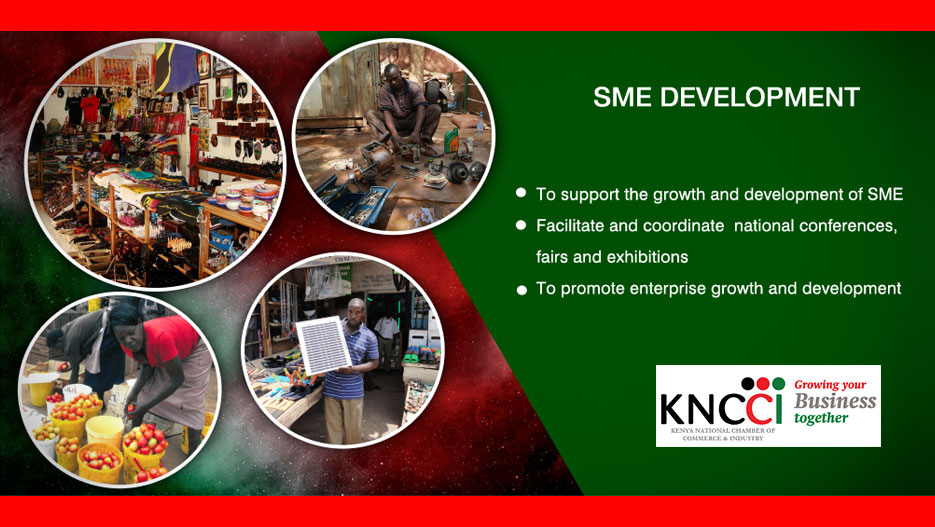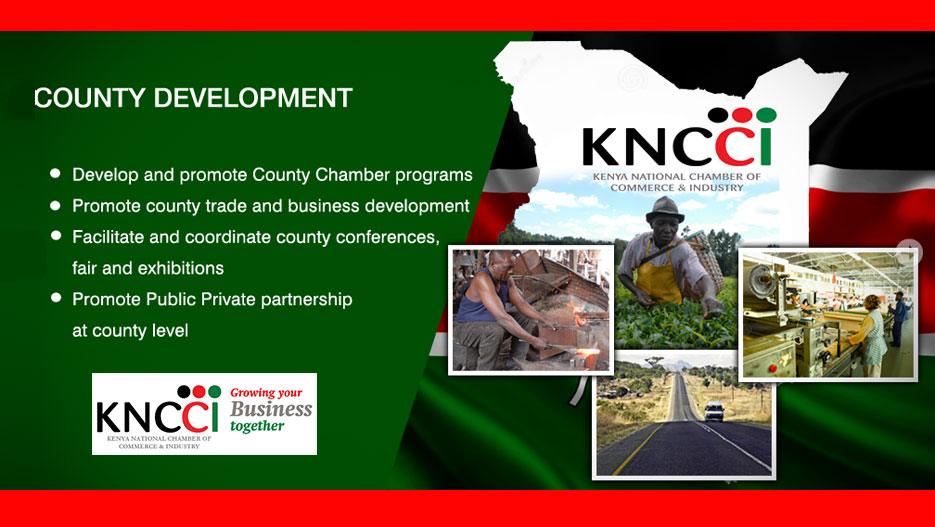KNCCI: Ease of Doing Business, Investments and Economy of Kenya
Matanda Wabuyele shares his view on the economy of Kenya, investments and doing business in the country. He also talks about the role of the Kenya National Chamber of Commerce and Industry.
Interview with Matanda Wabuyele, CEO of KNCCI (Kenya National Chamber of Commerce and Industry)
As the National Chamber of Commerce and Industry, what is your assessment of the economy of Kenya at the moment?
We represent business organisations, we have 20,000 members, three quarters of whom are small to medium enterprises, the rest being large enterprises. We are Kenya‘s premier business member-based organisation, and our role encompasses economic diplomacy, trade, policy and advocacy.
In terms of our assessment of the country’s economy, we believe Kenya is on a growth path. Our GDP growth is above 5.5%, close to 6%. We hope to reach double-digit growth by achieving our Vision 2030. If you look at Kenya’s population, we have 42 million people, and our exports stand at around KES 132 billion, with FDI at almost USD 1 billion, so our economy is doing well and we believe we are set for upward growth. As a country, our exports have grown, FDI inflows have grown. Compared to other countries in the region, Kenya is the country to invest in. We believe that we have a vibrant economy, we have the infrastructure in place, including the SGR railway. We also have infrastructure in terms of airlines, which allows us to connect with any other region. Moreover, we host international organisations such as the UN and the World Bank, and we are attracting investors, including American companies such as Google, who are just moving in, together with fast food companies who are setting up their African headquarters here. All of this makes Kenya an attractive destination for investors, and we are also proud of our political stability, which is among the main reasons why people have to invest in Kenya.
In short: political stability, sound infrastructure and a well-talented and educated workforce.
How would you describe the position of the National Chamber of Commerce and Industry within the Kenyan economy, and how strategic is your role in this context? Essentially, how does the economy benefit from your institution and what do you do to fulfil this role?
We believe Kenya is on a growth path. Our GDP growth is above 5.5%, close to 6%. We hope to reach double-digit growth by achieving our Vision 2030.
As the Chamber of Commerce and Industry, our vision is to create a vibrant and prosperous business community, through the facilitation of investment and trade, together with the protection of the interests of the business community. We work very closely with the government, in terms of economic diplomacy, in order to enhance the trade and investment framework. We operate under four pillars. The first is policy advocacy, the second is trade development, the third is small and medium enterprise development, and the fourth is county development. We belong to a worldwide network of 177 of chambers, and we leverage our services by calling upon this worldwide network. Locally, we have 47 county chapters of our chamber, across all country governments. This network places us in a better position to undertake our work. It allows for services such as trade missions, both incoming and outgoing. We provide services such as undertaking bilateral negotiations, we have signed over 100 MoUs (Memorandums of Understanding) with other chambers worldwide and we have also signed MoUs with strategic partners, such as county governments in Kenya. We are able to offer interventions, in terms of policy advocacy, in order to ensure that we have an enabling environment, with the right ecosystem to support the thriving business.

Is it not a little difficult to work closely with each one of them, due to the huge number of members? How do you do that?
You see, the 20,000 members are spread all over the country, and as a chamber we have 47 chapters, i.e. we have branches of the Kenya National Chamber of Commerce and Industry at county level which look after them. At the head office, we only have about 1,500 members. Therefore, we are able to use our network and framework, together with the governing structure in place, in order to provide services at county level.
How would you assess the ease of doing business in Kenya?
If you look at the recent ease of doing business rankings, Kenya moved up 28 positions, to 108, and we hope to move into the top 50 position. We have been recognised as a country that has shown the highest improvement in ease of doing business. In terms of company registration, we have moved from 21 days to about a week. When it comes to joint ventures, we are using the one-stop-shop, which has been set up by the Kenya Investment Authority, so as to be able to assist in registrations. We believe this one-stop-shop will allow us shift our ease of doing business index to below 50.
What would you say are the main challenges currently facing the Kenyan economy?
The main challenges that we face, which are challenges equally faced by other countries, include the issue of security. You may remember there was a bombing and terrorism scare in Kenya, so this still remains a threat, which we believe the government is working towards bringing under control. It will take a long time and may scare off some investors from coming here. We also have challenges with regard to interest rates, which are prohibitive and makes it difficult for SMEs to access affordable credit, and we believe there will be some interventions to address that issue. We also believe that there are areas that we need to enhance as a country. We are a commodity-based country, and we need to add value to our products or produce, for example coffee and tea. We are the largest producers of quality, i.e. Arabica speciality coffee, which is used for blending. We should be looking at how we can add value there. We are also among the leading exporters of tea, as well as flowers and vegetables to Europe. We need to be looking at how we can add value, so as to produce products that are ready for export in packaged form.
The other area where we can improve is in our efforts to attract investors to come to this country, invest in production and capitalise on the 300 million population we have in the East African Community, which would be extended to 600 million consumers as a result of the tripartite agreement signed between SADC, EAC and COMESA. This makes for a huge market, and we are appealing to investors to come here, which means enhancing our investment climate and we should look at ways to create greater incentives to attract investors to our country.
KenInvest works closely with these foreign investors. Does the Chamber of Commerce also work with them?
Yes, we do work very closely with them, by calling upon our 177-country worldwide network, whereby we bring in investors, hand in hand with the National Chamber of Commerce. In fact, over the past 8-12 weeks, we have already hosted five presidents under the business forum organised by the chamber, which has been very successful.

Do you have any upcoming events on this scale?
Yes, as is widely known, we recently had the WTO here, as well as UNCTAD. The country is now due to host the TICAD (Tokyo International Conference on African Development), which the Chamber is helping to organise. We are focusing on the B2B element, as well as the exhibition side, but we are looking to host more incoming trade missions and organising outgoing missions. We have a calendar of events available, which outlines the events we are considering in the near future. We are looking to take part in an event in Ethiopia; we have just had an event in Rwanda. We are looking at an expo in Britain, as well as an event in Germany and we are also looking at events in our region locally. Congo is coming up, while an event in Bujumbura has just been postponed, so there are a number of events listed in our calendar, where we will be endeavouring to mobilise the business community to take part, with the aim of holding business-to-business matchmaking sessions, allowing them to seal some deals.
In 5 years, where do you project Kenyan economy to be?
I believe we are headed towards double-digit growth. We see growth happening in the agricultural sector, especially in terms of agro-processing. We see growth happening in infrastructure, both in terms of the rail and road networks, which will eventually improve ease of doing business. We see growth happening in areas such as geothermal energy production and alternatives energies like solar power, as well as hydroelectric power generation. We expect growth in the education sector, fuelled by demand for quality education. We also see growth happening in the extractive industries, i.e. the mining industry. We are delving into minerals, in areas such as Taita-Taveta, as well as exploring oil in areas west of the Rift Valley, such as Baringo, where Tullow is already working. We also expect growth in terms of tourism.
What would be your final for our international audience considering Kenya as a business destination? Why should they come to Kenya and not somewhere else?
We believe that Kenya is a frontier for investment for the 21st century. Because of our geographic location, we are the region’s hub. In short, we have a thriving economy, we have sound infrastructure, and we have political stability. These are some of the critical success factors for good investment. We would also point to our return on investment, which is quite high in comparison to other regions, so we appeal to investors to seriously consider Kenya as destination for their investment.